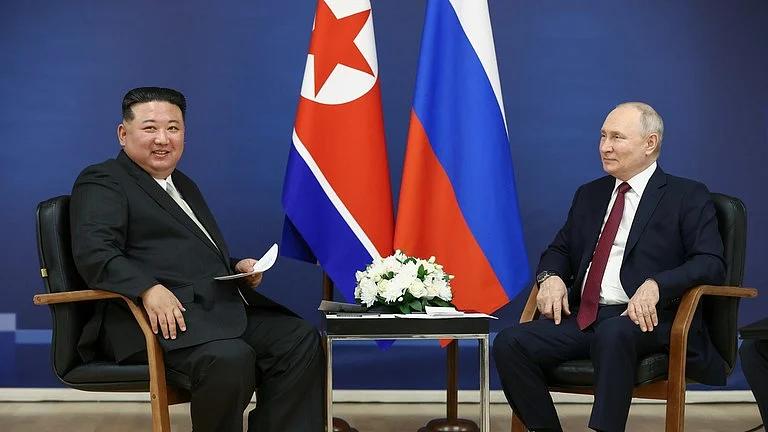
www.perplexity.ai
freepressjournal
Russian Foreign Minister Sergey Lavrov has issued a stern warning to the United States, South Korea, and Japan against forming a security alliance targeting North Korea, during his visit to Wonsan city where he met with North Korean counterpart Choe Son Hui amid flourishing military cooperation between Russia and North Korea.
Beyond weapons transfers, the partnership has expanded to include North Korean troop deployments to support Russia's war effort, with Ukrainian officials alleging that North Korea committed more than 10,000 troops by October 2024. While suffering heavy casualties, these deployments provide the Korean People's Army with valuable combat experience and exposure to modern battlefield tactics including drone warfare. In exchange, North Korea gains access to Russian expertise in military technology, including potential assistance with its nuclear, missile, and satellite programs, while also benefiting from Russia's diplomatic protection at the UN Security Council, where Moscow has already vetoed a panel monitoring sanctions against Pyongyang.
The military value of these troops remains questionable despite their numbers. They face significant challenges including language barriers, interoperability issues, and unfamiliar terrain. For Russia, these deployments help address manpower shortages while reducing domestic pressure to recruit more Russian conscripts. In exchange, North Korea gains combat experience for its forces, access to Russian military technology, and potential assistance with its nuclear and missile programs. The Pentagon has confirmed that North Korean troops have entered combat zones, making them legitimate military targets in what represents the first instance of a foreign government sending regular troops to support Moscow's war effort.
Lavrov also expressed Russia's understanding of North Korea's nuclear ambitions, stating: "The technologies used by North Korea are the result of the work of its own scientists. We respect North Korea's aspirations and understand the reasons why it is pursuing nuclear development." This position directly contradicts the stance of the US-South Korea-Japan alliance, which has consistently called for North Korea to cease activities threatening regional security. During their meeting, North Korean Foreign Minister Choe Son Hui characterized the Russia-North Korea relationship as "the invincible alliance" while reiterating North Korea's "unconditional" support for Russia's actions in Ukraine.
Russia-North Korea Military Cooperation
The Russia-North Korea military relationship has transformed dramatically since Russia's invasion of Ukraine, culminating in the June 2024 Treaty on Comprehensive Strategic Partnership signed by Vladimir Putin and Kim Jong Un during Putin's visit to Pyongyang. This mutual defense pact obligates both nations to "immediately provide military and other assistance by all means available" if either "is put in a state of war by an armed invasion." The treaty has yielded tangible military cooperation, with North Korea reportedly supplying Russia with approximately 20,000 containers of weaponry by October 2024, including over 5 million artillery shells that have supported Russian operations in Ukraine despite their high dud rate.Beyond weapons transfers, the partnership has expanded to include North Korean troop deployments to support Russia's war effort, with Ukrainian officials alleging that North Korea committed more than 10,000 troops by October 2024. While suffering heavy casualties, these deployments provide the Korean People's Army with valuable combat experience and exposure to modern battlefield tactics including drone warfare. In exchange, North Korea gains access to Russian expertise in military technology, including potential assistance with its nuclear, missile, and satellite programs, while also benefiting from Russia's diplomatic protection at the UN Security Council, where Moscow has already vetoed a panel monitoring sanctions against Pyongyang.
North Korean Troops in Ukraine
In October 2024, North Korea began deploying troops to Russia to support its war against Ukraine, marking an unprecedented escalation in the conflict. Intelligence sources estimate that approximately 11,000 North Korean soldiers have moved into Russia's Kursk region, with plans to potentially deploy up to 100,000 troops over time. These forces, which include elite special operations units, were initially transported to Vladivostok where they received Russian uniforms and fake identities before undergoing training at various military bases in eastern Russia.The military value of these troops remains questionable despite their numbers. They face significant challenges including language barriers, interoperability issues, and unfamiliar terrain. For Russia, these deployments help address manpower shortages while reducing domestic pressure to recruit more Russian conscripts. In exchange, North Korea gains combat experience for its forces, access to Russian military technology, and potential assistance with its nuclear and missile programs. The Pentagon has confirmed that North Korean troops have entered combat zones, making them legitimate military targets in what represents the first instance of a foreign government sending regular troops to support Moscow's war effort.
Trilateral Security Concerns
During his visit to North Korea, Russian Foreign Minister Sergey Lavrov specifically criticized what he described as military buildups by the US, South Korea, and Japan around North Korea, warning: "We warn against exploiting these ties to build alliances directed against anyone, including North Korea and, of course, Russia." This statement came as the three countries had been expanding their trilateral military exercises in response to North Korea's advancing nuclear program, with a joint air drill involving US nuclear-capable bombers taking place near the Korean Peninsula just a day before Lavrov's comments.Lavrov also expressed Russia's understanding of North Korea's nuclear ambitions, stating: "The technologies used by North Korea are the result of the work of its own scientists. We respect North Korea's aspirations and understand the reasons why it is pursuing nuclear development." This position directly contradicts the stance of the US-South Korea-Japan alliance, which has consistently called for North Korea to cease activities threatening regional security. During their meeting, North Korean Foreign Minister Choe Son Hui characterized the Russia-North Korea relationship as "the invincible alliance" while reiterating North Korea's "unconditional" support for Russia's actions in Ukraine.

No comments:
Post a Comment